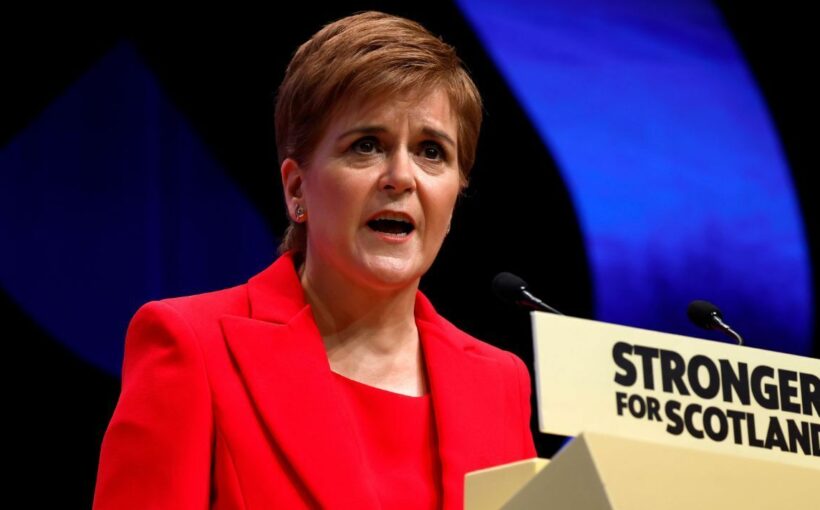Sturgeon clashes with reporter over independence questions
We use your sign-up to provide content in ways you’ve consented to and to improve our understanding of you. This may include adverts from us and 3rd parties based on our understanding. You can unsubscribe at any time. More info
Nicola Sturgeon’s economic blueprint for an independent Scotland has been torn apart by a critic who warned it “highlights huge problems in neon lights”. The First Minister has continued to insist an independent Scotland would establish its own central bank and adopt a new currency after a “careful and phased” transition following Scottish independence. The transition from the British pound to a new Scottish currency should be as short as “practicable”, according to the SNP leader.
Ms Sturgeon’s comments came following the release of the third in a series of papers designed to demonstrate how an independent Scotland would function if it did indeed split from the rest of the UK.
Last year, Scotland’s deficit was 12.3 per cent of gross domestic product – double that of the UK. She has claimed an independent Scotland would have a similar deficit to the rest of the UK, although she has yet to specify what that would be.
But her economic blueprint has been torn apart, with one critic warning the latest economic plan has instilled even greater uncertainty into the Scottish population.
Alistair Carmichael, Liberal Democrat Home Affairs and Northern Ireland spokesperson and MP for Orkney and Shetland, told Express.co.uk: “This latest paper from the Scottish Government on plans for an independent Scotland around the economy and adoption of currency leaves many more questions than answers.


“It is difficult to work out why they wanted to do this, and I can only assume they thought if they got the economic arguments out of the way early, then they could concentrate on the more emotional and identity arguments – that’s where their real interests and concerns lie.
“But that has backfired badly because they would have wanted to point to this paper as the answer to all economic questions but in fact all they have done is highlight in neon lights the fact that there are no answers to the economic questions about independence.”
The currency an independent Scotland would use dominated the campaign ahead of the 2014 referendum and looks likely to follow the same path this time around.
Scotland could be left without automatic access to Bank of England support in the event of financial headwinds if the country uses the pound without the agreement of the UK Government.

Mr Carmichael told Express.co.uk: “It was anticipated this paper would be received like everything else in Scotland these days – if you are in favour of independence then you will praise it, but if you are not, you will criticise.
“In fact, the response has been universal criticism, and rightly so, as this is an incredibly thin piece of work, and it was inevitably going to be so because the economic piece just isn’t there.
“If Scots look back at what has happened over recent years, and think back to the Covid pandemic, we were able to undertake the rescue package and things like the furlough scheme because the UK is able to undertake a programme of quantitative easing, which involves the Bank of England lending money to the UK Government.
“To put it another way, we have been printing money.”
DON’T MISS
‘Shameful Shamima saga is just a cover’ [OPINION]
The US and UK need to take the lead with ‘friendshoring’ to beat China [COMMENTS]
Russian supersonic fighter jet crashes during training flight [LATEST]

He added: “Don’t get me wrong – there are a lot of long-term problems with that, but it is something you can do when you are part of the big economy that is a well-established and respected economy and when you have a well-respected central bank like the Bank of England.
“If Scotland is going to be independent, is it going to have its own currency? Is it going to have a central bank in the way you would expect? What do you do when the unexpected hits?
“If we have learnt nothing else in the past three years, we have surely learnt that we have no idea what is around the corner.”
Last week, Ms Sturgeon’s independence plans suffered a huge blow when the Supreme Court ruled she does not have the power to hold the vote without the UK Government’s consent.

Court president Lord Reed rejected the argument from the Scottish Government that any referendum would simply be “advisory” and would have no legal effect on the union.
This would have seen people only being asked to give their opinion on whether or not Scotland should become an independent country.
Ms Sturgeon has stood firm and admitted that while she was disappointed but respected the court’s ruling, judges do not make the law and only interpret it.
The First Minister insisted a referendum remained her preferred option, but without an agreement in place, the SNP would use the next UK general election as a “de facto referendum” in an attempt to show that a majority of people in Scotland support independence.
Source: Read Full Article
